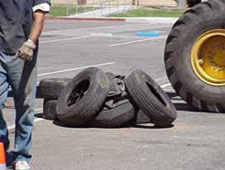Laws/Statutes

Scrap tires are managed primarily at the state level. About 48 states have laws or regulations specifically dealing with the management of scrap tires. While each state has its own program, some typical features include:
- Funding via taxes or fees on automobiles or tires.
- Market development activities.
- Licensing or registration requirements for scrap tire haulers, processors and some end users.
- Manifests for scrap tire shipments.
- Requirements regarding who may handle scrap tires.
- Financial assurance requirements for scrap tire handlers, storage facilities, and disposers.
- Tire pile clean-up.
In 1985, Minnesota enacted the first state law for the management of scrap tires. By now, 48 states have enacted laws that address scrap tire management. Alaska and Delaware do not have any scrap tire laws or regulations.
Each state makes its own scrap tire laws and regulations. These laws typically set the stage for rules for scrap tire storage, collection, processing, and use. States also establish programs to clean up old scrap tire stockpiles, and the funding needed to accomplish that goal. More information about state tire programs.
In recent years, scrap tire legislation has been a priority in many states. This is an indication that the majority of legislatures recognize that creating viable markets for scrap tires is an integral component of each state’s environmental and recycling policies.
Tire Roundtable
In New York, representatives from the scrap tire industry, tire manufacturers, environmental groups, scrap tire end-users, and the municipal recycling/solid waste sector formed a roundtable group to address the state’s scrap tire problem. In January 2000, the roundtable developed a consensus document that was eventually turned into a legislative package. Key elements included:
- Dedicated tire fee to be used to fund initiatives.
- Short- and long-term market development programs.
- Consumer education programs.
- Creation of a stockpile remediation and abatement program.
Tire Fees
Many states collect fees to fund scrap tire management programs or stockpile cleanup. Tire fees are typically assessed on the sale of new tires or on vehicle registrations. Fees generally range from $0.50 to $2 per passenger car tire, and truck tire fees range from $3 to $5.
Some scrap tire fees also help local communities establish market programs, create licensing/enforcement systems, and host tire collection programs/amnesty events. States and municipalities may also use money generated by scrap tire fees to offer grants or loans to scrap tire processors and end users of tire-derived materials.
California
California’s Department of Resources Recycling and Recovery (CalRecycle) is using a multi-tiered approach to tackle the state’s tire problems:
- Identify illegal tire piles for cleanup and provide the funds to accomplish the job.
- Develop markets—enhance end products through the establishment of special recycling zones and grants.
- Conduct balanced enforcement action through scrap tire hauler licenses, public education and by targeting recyclers, collectors, and processors that are not in compliance.
- Enforce requirements regarding pile size, storage time, and fire prevention at permitted tire storage sites.
![[logo] US EPA](../gif/logo_epaseal.gif)